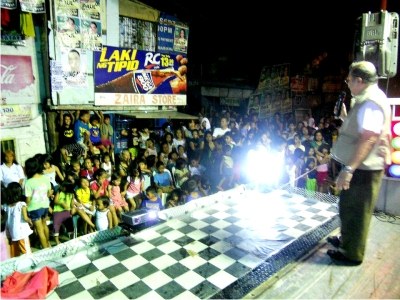| |
.. |
|
Voters' Education: A challenging new experience for us
|
|
from
NAMFREL Election Monitor Vol.3, No.1 |
|
by Bp. Benedicto S. Navarro, Chairperson,
NAMFREL-Marikina |
|
|
It was no easy task, but we took the challenge. To
even think of pulling the people out from what they have been used to doing for
decades, in fact every election since the Philippines gained its independence
and began exercising their right of suffrage, has been like fighting an
invisible foe. But nevertheless, since we were given this task, then, we had to
do it.
The first thing we did was to come up with the content of the Voter's Education
program and how to execute it. We considered the uniqueness and demography of
the people in our City so that the content of our Voter's Ed could be suited to
their intellectual mind-set and needs. |
We received the Manual for VotEd from the Namfrel
Secretariat and gathered some other materials and came up
with our own which we called "Electoral
Community Forum." So that it would be more effective, we
came up with a Tagalog version. We decided to limit the time
of the entire seminar to two hours with this simple outline:
What to do during Election Day; What not to do; What are the
Basis in Selecting the Right Candidates; and, what is the
PCOS machine and How to Use it. Then we selected from among
ourselves who will talk on which topic, giving each speaker
fifteen to twenty minutes to talk on his topic. To draw
crowds, we encouraged communities to participate by way of
young people or children who formed themselves into dance
groups or singing groups. Or, raffle something. We did
everything just to draw a good crowd.
|
|
 |
|
Our plan was to saturate the different
Barangays with our message and the question was how to do it in the
fastest way at the minimum of cost. Fortunately, one of our members
own a Mobile Stage Truck and he offered us the use of it. Of course
we grabbed the opportunity and made full use of it. Our organization
included a Coordinator for each Barangay; we then asked each
coordinator to organize for us community and sectoral forum in the
different Barangays. In Marikina, we have sixteen Barangays, and we
averaged two to three forums a day. We would position our Mobile
Stage in strategic locations, like market places, basketball courts,
in front of churches, squatters' areas, schools, etc. We even
developed our own Election Song which we played before our forum to
draw crowd; we encouraged the audience to learn the song, and we
held a contest among the children in the audience that whoever could
sing it would receive something, most of the time, candies.
We visited all sixteen Barangays; each visit we averaged reaching
three to five hundred people. On May 11, two days before Election
Day, from 3 in the afternoon to 10 in the evening, we held a
Marikina-wide mobile voters education saturation campaign (18 stop-overs,
20 minutes teaching per stop over, average 555 people per stopover
or 10,000 people reached, not to mention our mobile announcements in
between stop-overs covering an approximate audience of additional
30,000 people. |
|
|
 |
|
Photo:
https://www.facebook.com/C2G2MarikinaElectionWatch2013 |
|
.. |
However, we have the following
observations. We were informed that
certain officials coerced and
intimidated prospect attendees not
to participate in the sessions.
Voters' apathy or lack of interest
among target participants were
observed to be significant in
numbers. Traditional selection
criteria in choosing candidates were
observed based on popularity or
celebrity status, affiliation,
acquaintance, influence,
coercion/intimidation, brainwashed
blockvoting, patronage, etc.
Ignorance and poverty were used by
the politicians to persuade them to
sell their votes and/or offer them
in-kind products, services, such as
bags of rice and groceries and/or
hiring them as watchers, volunteers
and campaigners. Also observed were
the use of government
vehicles in transporting their
supporters and campaign
paraphernalia as well as the use of
government facilities as venues for
their campaign sorties, including
the use of
communication equipment for the same
purposes, e.e. mobile phones,
internet connection, landlines,
computers, laptops,
etc. and, the use of the more than
6,000 city employees as harassed and
coerced campaigners in support of
the administration party-candidates
for electioneering purposes. |
|
|
|
|
We plan to continue educating our people
in-between elections. This is the only way, we believe, that graft
and corruption can be curved. An empowered, well-informed population
can never be fooled, harassed or coerced by anybody. |
|
|
| |
.
.
. |
|
| |
| |
|
|

